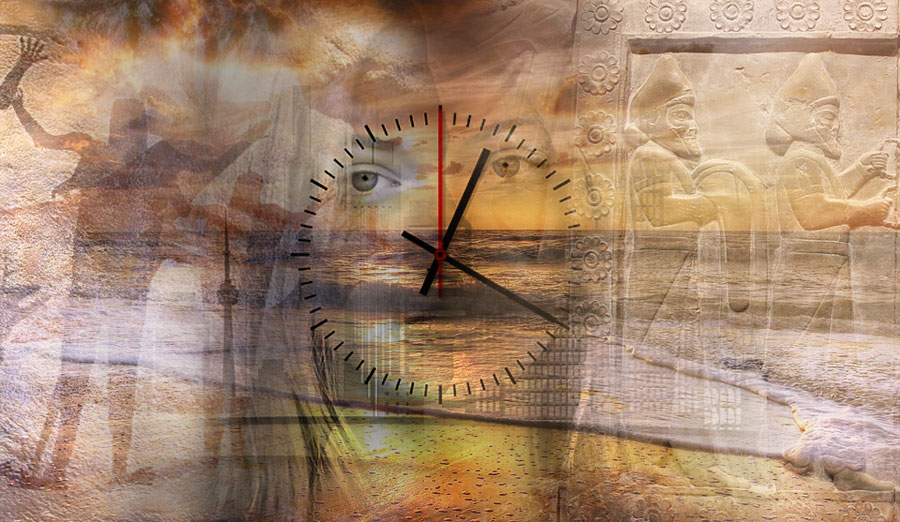Edgar Cayce On Karmic Lag-Time
 by Gina Cerminara
by Gina Cerminara
A curious fact, observable in the cases of physical karma already discussed here, is that the karmic consequence of an action sometimes shows itself only after an interval of one or more lifetimes. The question arises as to why this karmic suspension is necessary. Why should not the reaction begin immediately, with the promptness of a ball rebounding from a wall?
There would seem to be several answers to this question. One is that the ego must wait for a time and place appropriate to the karma which it has created. It may take centuries before such a suitable opportunity presents itself, and the intervening centuries are to be used for the working out of other character problems. A good example of this type of karmic suspension is seen in the Cayce data on entities who once lived on the lost continent of Atlantis.
The existence of this vast ancient continent beneath the Atlantic Ocean has never been fully proved or disproved by science, though a fairly good case for it has been made on the basis of historical, geological, and cultural evidences. The principal historical secondary source is Plato, who refers to Atlantis quite seriously in the Critias and Timaeus dialogues. One of the geological evidences often cited is the discovery made when a trans-Atlantic cable snapped and sank to a depth of ten thousand feet; when dragged to the surface the cable brought with it pieces of lava which under microscopic examination were shown to have been hardened on land areas above water. Among the cultural evidences perhaps the most striking are, first, the universality of the flood story (it is found not only in the Bible but also in the legends and religions of almost all primitive peoples in the world); and second, the close similarity of language and architecture between Egypt and Central America at an age when no communication between the two continents is known to have existed. All considered, the total evidence is persuasive, though by no means conclusive.
At any rate, if the Cayce readings are to be accepted, Atlantis did very definitely exist. According to Cayce, certain unopened chambers in the Great Pyramid may some day disclose full records of its history and civilization. These records were brought there, he said, when some of the inhabitants of the doomed continent fled to Egypt at the time of the third and last cataclysm, about 9500 B.C. Cayce also referred to the island of Bimini, off Miami, Florida, as an Atlantean mountain peak; he stated that on the sea-bottom here could be found a fine example of an Atlantean temple with its dome constructed for the capture of the sun’s energy by means of specially designed crystals. According to the readings, the Atlanteans had reached a much higher peak of scientific efficiency than we have. Electricity, radio, television, air travel, submarines, and the harnessing of solar and atomic power were highly advanced among them; they had much more efficient techniques of heating, lighting, and transportation than we now possess.
All this is of absorbing interest, whether one takes it seriously or not; but the significant thing to note here, if one does take it seriously, is this: the life readings repeatedly stated that the Atlanteans became evil in their misuse of the titanic forces that they had learned to develop. They committed some of the greatest depravities in connection with electrical and psychic powers, and especially with a form of hypnosis which was used to enslave others for forced labor of sexual gratification.
If this can be accepted as a true account, then it is understandable that this ancient corruption of character could not very well be completely redeemed in eras when neither electricity nor occult and psychological knowledge was available. The final test of a man’s having surmounted gluttony is to surround him once again with his favorite food, and see if he remains temperate. A man cannot be said to have conquered his sexual desires if, when placed in the midst of desirable women, he does not resist temptation with the stubborn tenacity of St. Anthony. Similarly, the entities who misused the tremendous power available to them by Atlantean science at its height cannot be said to have transmuted their selfishness and lust for power unless, when offered the same opportunities, they can use them constructively.
The cyclic progress of history has made the twentieth century just such a period; consequently we find, according to the Cayce readings, that Atlanteans are incarnating at present in great numbers. The amazing technology of the present age can therefore be understood under two aspects: first, as the consequence of the bold, inventive genius of egos who brought with them a remembrance of Atlantean achievements; and second, as the testing ground for these same egos, to determine whether in the intervening centuries they have acquired qualities that will withstand the renewed temptation to selfishness and civilized barbarity.
The need to wait for an appropriate culture epoch, then, seems to be a major factor in determining karmic suspension. It would seem to be related to some cyclic progression of history and some rhythmic alternation of groups of souls in their periods of embodiment and non-embodiment on this planet. It seems reasonable that great waves of races and peoples could follow such cosmic and rhythmic regularity of return. Various passages in the Cayce readings indicate, however, that the incarnation of smaller groups within the waves, and even of individuals within the groups, may not be merely a matter of mechanically rhythmic predetermination. Souls and groups of souls do not return with the automatic regularity of a revolving door; here, as everywhere in creation, there is freedom of will and an individual or a group may choose to manifest at certain times if it wishes to.
This leads then to the further complexity that if any individual entity needs to develop some quality with respect to another individual soul, or group of souls, he may need to delay his own incarnation to conform with the period chosen for embodiment by the others. And if such a delay is extensive he may find it expedient to return meanwhile to work on some other aspect of his development—thus giving rise to the phenomenon we have noted as suspended karma.
These generalizations cannot be made with scientific certitude, of course, but are proposed only on the basis of scattered but repeated indications that this is so in the Cayce readings.
The above-mentioned factors represent purely external determinants of karmic suspension; but there would seem to be inner determinants as well. Of equal if not greater importance is the psychological fact that strength is needed to meet karma; some opportunity must be given the entity to acquire the necessary combative qualities, otherwise the karmic obligation will be so overwhelming as to result in annihilation rather than growth.
Several afflicted people who learned in their Cayce reading that the origin of their affliction was to be found several lifetimes previous were curious about the reason for the karmic lag. All who inquired about this point in a later reading received substantially the same answer as about a lame girl for whom it was asked: “Why did the entity wait until this incarnation to make good the karma from the Roman period?” The answer: “Because it was unable to do it before.” The context is clear that this inability was a matter of inner capacity rather than outer restriction; in this and other cases of affliction, close analysis of the intervening lives shows that there were necessary experiences for the acquisition of certain positive qualities.
If we refer back to a case of a sixteen-year-old boy injured in an automobile accident, for example, we will observe that the karmic seed in this case was sown in ancient Rome. An experience in the American Revolutionary period, however, gave him the opportunity to develop certain qualities of courage and cheerfulness and the ability to put to good account whatever came his way. These were necessary qualities for the bearing of the karmic affliction that came to fruition in the present.
An instructive parallel is found in the commonsense practice of men with regard to monetary debts. The man who borrows five thousand dollars from a bank is in no position to repay the debt the following day, week, or month, and probably not even the following year. For this reason time is allowed the borrower, that he may gather together sufficient resources; there would be no point in demanding repayment the following week when it is obvious that he has nothing with which to pay. Possibly cancellation of debts incurred in the moral realm is handled in a similar way.
If the reincarnation principle should some day win popular acceptance, and the concept of karma be at least roughly understood by the masses of the West as it already is by the masses of the East, the notion of suspended karma may become a source of concern to many people. The thought that some past act of cruelty may demand future payment in the form of blindness in this or in a forthcoming life is, admittedly, an unwelcome one; to an impressionable imagination an unknown karmic debt may appear to hang like the sword of Damocles over one’s head, or lie in wait like a beast of prey beyond the bend of the road. Suspended karma might well become the bugaboo of the first decades of the Reincarnationist Age as the devil and hell-fire were the bugaboos of a former one.
To counteract this tendency toward fear, the leaders of New Thought schools may, in fact, go so far as to make wholesale denials of suspended karma, much as the Christian Scientists make denials of sin, disease, death, error, and matter. There is no doubt that such denials would have great suggestive power and, as in the case of Christian Science and New Thought generally, might even accomplish healthful results in the direction of spiritual strength. However, to “deny” matter and sin and karma verbally does not actually annihilate them. Our task in life is not to hide from the reality of matter, with the cheerful but deluded evasion of the ostrich; our task is to govern it, order it, and even create it from the higher levels of spirit. In reality, matter is only a condensation of an energy which may be called spirit; or matter is merely spirit at a lower degree of vibration.
Similarly with respect to sin and karma. According to reincarnationists, to “deny” karma, either presently operative or in suspension, is equivalent to denying the existence of debts to be paid and lessons to be learned and is an essentially dishonest attitude. A man who is deceitful and fraudulent in regard to his obligations, whether they be of a material or spiritual nature, commands no respect. Just because the attempted fraud consists of mental acrobatics of denial does not alter the fact that it partakes essentially of the effort to dodge accountability.
This is not to say, however, that suggestion should not be used. On the contrary, it may be very helpful in dissolving mental fixations, mechanisms of guilt, or crystallizations of attitude. We have seen one remarkable case—that of the boy cured of bed-wetting—in which suggestion was directed to the subconscious sense of guilt. It was his feeling of worthlessness that was inflicting symbolic punishment upon himself. By dissolving this guilt feeling and thereby freeing him to express helpfulness to his fellowman, both his bodily condition and personality were transformed.
In the case of allergy, also, deep suggestion and hypnosis were recommended by the reading. But in neither case was the suggested treatment one of denial—on the contrary, it was to consist of “affirmation of virtue” and “consciousness of spiritual attunement.” If mental healers wish to “treat” for karmic conditions or for the oppressive sense of impending karma, the treatment, it seems, should make honest acknowledgment of past obligation, then express honest willingness to meet that obligation, and finally affirm that particular strength the absence of which led to the karma to begin with.
If the reincarnationist view is to be accepted then, it is necessary to face the fact that the human race is spiritually immature and consequently its members must expect unpleasant karma in future lives. But this fact should not be a source of fear or anxiety, and this for two reasons: first, Sufficient unto the day is the evil thereof is a maxim that applies not only to the living of each day with unconcerned tranquility; it applies also to the living of each life in the calm assurance that whatever may be its hardships the individual portion is just one, tempered to individual strength. At no time do we become involved in karma too great for us to bear. Second, the uncertainty of the future is always with us, whether or not we believe in karma; and if future calamities that may befall us are karmic rather than haphazard our fears should be alleviated rather than intensified, if only for the simple reason that karma represents the operation of a law which is so ordered as to guarantee justice always.
It is understandable in man to fear future hardships, but it is not becoming in him to fear future hardships that come to him justly, for the sake of his education and the expansion of his consciousness. An honest man who has incurred a debt is anxious to pay it; he conscientiously takes care of the financial affairs of each day so that on the first of the month, when his bills come due, he will be in a position to pay them. He does not live all month in fear of the day when he will inevitably receive the bills; he devotes his energies instead to making himself able to fulfill his obligations.
We are not aware, in our limited conscious minds, of the exact nature of the moral debt that we may have contracted in our ignorant past, but we should have that integrity of mind and that acquiescence of spirit that mark honest men everywhere, such that we go forward to meet our debt with simple willingness to pay.
But perhaps the word debt is misleading—perhaps the more appropriate word would be deficit, or deficiency. A deficiency disease must be fought by supplying the vitamins and minerals in which the body is deficient; until the deficiency is repaired the body is not healed of the disease. Similarly, karma is made possible, in one important and fundamental sense, only by the absence of spiritual qualities; only by the lack of awareness of one’s spiritual identity. The proper correction of karmic conditions, then, consists in supplying the spiritual qualities the deficiency of which induced the condition to begin with, and in evoking the awareness of spiritual identity.
But whether karma is regarded as a debt or a deficit or a sort of spiritual deficiency, the fact remains that its redemption must be approached in a spirit of willingness rather than of rebellion. To “deny” its existence partakes more of the nature of rebellion than of acquiescence; for such a “denial” is expressive of the self-will and desire for convenience of the present personality, rather than of the long-term wisdom of the eternal identity.
The Cayce readings frequently give counsel for the proper attitude to take with regard to karma. The following passage gives a particularly pointed suggestion:
“If the experience is used for self-indulgence, self-aggrandizement, or self-exaltation, the entity does so to its own undoing, and creates for itself that which has been called karma and which must be met. And in meeting every error, every trial, every temptation, whether they be mental or physical experiences, the approach to it should always be in the attitude of: “Not my will, but Thine, O God, be done in and through me.”
“Thy will” can be understood, of course, in two senses: either as the “will” of God, which expresses itself through the impersonal laws of the universe, or as the will of the eternal identity, the Oversoul, who, in the esoteric tradition, is the Father to whom we address our prayers. Whichever interpretation is placed upon the phrase, acquiescence and trust should mark our attitude toward whatever karma may come our way.
In the universe of order and justice and beneficence which the reincarnation principle reveals, there is no need for fear.
Excerpt from Many Mansions
Posted in Other Topics, Past Life Therapy, Reincarnationwith 1 comment.






Interesting and logical – all part of the Big Picture of Humanity in the universe…